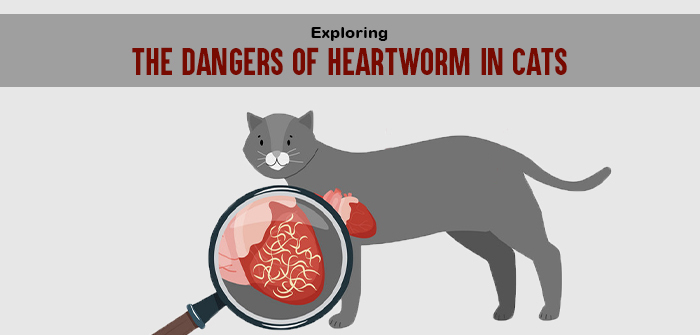

Exploring the Dangers of Heartworm in Cats
Heartworm disease is a widely recognized health concern for dogs, but did you know that it also poses a significant threat to our feline friends? While heartworm might be more commonly associated with dogs, the risks for cats should not be overlooked. In this blog, we will delve into the topic of heartworm in cats and shed light on why it can be particularly worrisome.
Read on to discover the importance of cat heartworm treatment and the best feline heartwormers available.
Understanding the Dangers of Heartworm in Cats
Heartworm disease is caused by parasitic worms that reside in the heart, lungs, and blood vessels of infected animals. Unlike dogs, cats are not the typical hosts for heartworms. Their immune system’s response to the parasites differs, which leads to unique challenges and risks.
Here are some key points to consider:
1. Misleading Symptoms: Cats infected with heartworms often exhibit subtle or non-specific symptoms, making diagnosis challenging. Respiratory issues, vomiting, and weight loss are examples of symptoms that may be mistaken for other health issues.
2. Difficult Diagnosis: Detecting heartworm infection in cats is a complex process. Traditional diagnostic tests used for dogs are less accurate for feline cases. This means that heartworm disease can go undetected until it reaches an advanced stage.
3. High Fatality Rate: Heartworm disease in cats can be deadly. Even a small number of worms can cause severe damage to the delicate pulmonary vessels and heart, leading to fatal consequences. In some cases, sudden death may occur without warning signs.
Causes of Heartworm Infection in CatsHeartworm disease, typically associated with dogs, can also afflict our feline companions. Understanding the causes of heartworm infection in cats is essential for prevention and timely intervention.
1. Mosquito Transmission: The primary cause of heartworm infection in cats is the bite of an infected mosquito. When a mosquito bites an animal infected with heartworm larvae, it ingests these immature parasites. Within the mosquito, the larvae further develop into their infective stage.
2. Infective Larvae Enter Cats: When an infected mosquito bites a cat, it injects the infective larvae into the cat’s skin. The larvae then enter the bloodstream and begin migrating to the blood vessels of the heart and lungs.
3. Atypical Host Response: Cats are considered atypical hosts for heartworms. Unlike dogs, they have a unique immune response to the presence of heartworm larvae. This results in a lower prevalence of adult worms in cats and different clinical manifestations. However, even a few worms can cause severe health issues in cats.
4. Maturation and Growth: Once the heartworm larvae have reached the heart and lungs of the cat, they continue to grow and mature into adult worms. This process can take several months. As the adult worms reproduce, they release microfilariae (baby heartworms) into the cat’s bloodstream, which can be picked up by mosquitoes, continuing the transmission cycle.
Heartworm infection in cats is primarily caused by the bite of an infected mosquito. It is crucial for cat parents to be aware of this mode of transmission and take preventive measures to protect their feline friends. Consult with your veterinarian to establish a heartworm prevention plan that suits your cat’s individual needs and risk factors. Remember, proactive prevention is the best defense against heartworm disease in cats.
Importance of Cat Heartworm TreatmentGiven the unique challenges associated with heartworm disease in cats, it is crucial to prioritize prevention and treatment. Here’s why:
1. Protecting Their Health: Administering a helps prevent the development of heartworm disease and its potentially life-threatening consequences. Prevention is always better and safer than attempting to treat an advanced infection.
2. Comprehensive Approach: Best cat heartworm treatments not only target heartworm larvae but also address other common parasites like fleas and intestinal worms. This comprehensive approach ensures your feline companion is protected from multiple threats.
3. Regular Veterinary Check-ups: Regular visits to your veterinarian allow for early detection and intervention. They can perform specialized tests designed for cats, ensuring prompt diagnosis and appropriate treatment.
Best Cat Heartworm Treatment OptionsWhen it comes to feline heartwormers, it’s crucial to consult your veterinarian to determine the most suitable option for your cat. They may recommend products specifically formulated for cats, such as topical or oral treatments. Some widely recognized cat heartworm treatments include , , and . These provide effective prevention against heartworms and other common parasites as well.
Risk Factors for Heartworm Disease in CatsIt is essential to acknowledge the risk factors that can make cats susceptible to this potentially life-threatening condition. By understanding these risk factors, cat parents can take proactive measures to safeguard their feline companions.
1. Geographical Location: The prevalence of heartworm disease in cats can vary depending on the geographic location. Cats living in regions with high mosquito populations and a higher incidence of heartworm disease face an increased risk. Warmer climates and areas with ample mosquito breeding grounds present a higher exposure risk for cats.
2. Outdoor Lifestyle: Cats that spend a significant amount of time outdoors have a higher likelihood of encountering infected mosquitoes, thereby increasing their risk of heartworm infection. Outdoor cats have more opportunities for mosquito bites, especially during peak mosquito activity periods.
3. Lack of Preventative Measures: Failure to administer regular heartworm preventatives to cats leaves them vulnerable to infection. Preventative measures, such as administering veterinary-recommended medications, can significantly reduce the risk of heartworm disease. Regular preventive treatments help kill heartworm larvae and prevent the infection from taking hold.
4. Presence of Infected Dogs: The presence of infected dogs in the household poses a risk to cats as well. Mosquitoes can transmit heartworm disease from infected dogs to cats. If a cat shares a living space with an infected dog and is exposed to the same mosquito population, their risk of contracting heartworm disease is heightened.
5. Individual Immune Response: Each cat’s immune response to heartworm infection can vary. Some cats may be more susceptible to developing severe disease symptoms, while others may exhibit a more mild or asymptomatic response. However, it is important to note that even mild cases can lead to long-term health complications.
Understanding the risk factors associated with heartworm disease in cats empowers cat parents to make informed decisions and take preventative actions. By addressing these risk factors, cat parents can significantly reduce the chance of their feline companions contracting heartworm disease.
ConclusionWhile heartworm disease may be more commonly associated with dogs, the impact it can have on cats should never be underestimated. The unique challenges faced by our feline friends make prevention and early detection vital. Consult with your veterinarian, prioritize cat heartworm treatment, and provide your cat with the protection they deserve. By doing so, you can ensure a healthier, happier life, free from the silent threat of heartworms.

- Business Name
- MAX PET SUPPLIES PTY LTD
- Business Category
- Pet Care
- Official Website
- vetsupply.com.au
- Business Number
- 86 603 803 738
- Social Links
- Phone Number
- 1-300-838-787
- Business Location
- 106 Station Rd
Seven Hills 2147
New South Wales
Australia





